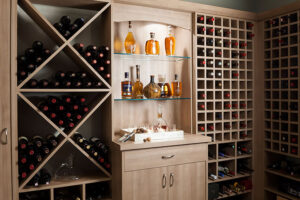As wine enthusiasts, we understand the importance of preserving the integrity and quality of our favorite vintages. Proper storage conditions play a vital role in ensuring that wines age gracefully and maintain their unique characteristics. Whether you’re a collector, a sommelier, or simply an avid wine lover, investing in suitable wine storage solutions is essential. In this article, we will explore the various options available for storing wine and delve into the key factors to consider when choosing the ideal storage solution for your collection.
The Significance of Proper Wine Storage
Wine is a delicate beverage that is highly susceptible to external factors such as temperature fluctuations, light exposure, humidity levels, and vibration. These factors can all have a significant impact on the flavor, aroma, and overall quality of the wine over time. Therefore, it is crucial to provide an environment that minimizes these potential risks. Effective wine storage solutions ensure that your investment remains protected and your wines continue to evolve in the desired manner.
Wine Refrigerators or Wine Coolers
Wine refrigerators, also known as wine coolers, are a practical and cost-effective option for storing smaller wine collections. These units are designed to maintain a consistent temperature range, typically between 45°F to 65°F (7°C to 18°C), creating an ideal environment for wine storage. Wine refrigerators come in various sizes, making them suitable for both residential and commercial settings. Additionally, they offer the convenience of adjustable shelving, ensuring that different bottle sizes can be accommodated.
Wine Cellars or Wine Rooms
For wine enthusiasts with larger collections or a desire to create a dedicated space for their wines, wine cellars or wine rooms are an excellent choice. These storage solutions provide a controlled environment that minimizes temperature fluctuations and maintains an optimal level of humidity. Wine cellars can be custom-built or pre-fabricated, depending on your budget and available space. They often feature insulation, vapor barriers, and specialized cooling systems to maintain ideal conditions for long-term wine storage.
Wine Racks or Wine Cabinets
Wine racks and cabinets are versatile options that cater to both functionality and aesthetics. These storage solutions come in a wide range of designs, materials, and sizes, allowing you to choose one that suits your personal style and storage needs. Wine racks can be freestanding or wall-mounted, offering flexibility in terms of placement. While they may not provide the same level of environmental control as refrigerators or cellars, wine racks and cabinets are an affordable option for storing a moderate-sized wine collection.
Temperature Control
Temperature is one of the most critical factors in wine storage. The ideal temperature range for most wines falls between 45°F to 65°F (7°C to 18°C). Fluctuations in temperature can cause the wine to expand and contract, leading to the degradation of its flavors and aromas. Ensure that your chosen storage solution provides a consistent temperature and allows for adjustments to accommodate different types of wine.
Humidity Levels
Maintaining the correct humidity levels is crucial to prevent the corks from drying out or mold growth. Ideally, humidity should be around 60-70%. Insufficient humidity can lead to oxidization, while excessive humidity can result in label damage and the growth of mold. Select a storage solution that incorporates humidity control mechanisms or consider using a separate humidifier or dehumidifier depending on the environment.
Protection from Light
Exposure to light, especially ultraviolet (UV) rays, can be detrimental to wines, causing them to age prematurely and lose their flavor. Choose storage options that provide adequate protection from light, such as tinted glass, solid doors, or even storing wine in dark storage spaces.
Vibration and Movement
Vibration and movement can disturb the sediment in wine, affecting its overall quality. Opt for storage solutions that minimize vibrations, such as wine coolers with vibration-dampening features or solid wine racks. Additionally, avoid storing wines near appliances or areas prone to frequent movement.
Maintaining and Monitoring Your Collection
Once you have chosen the perfect wine storage solution, it is crucial to regularly monitor and maintain your collection:
– Keep an inventory of your wines, including their location and acquisition dates.
– Regularly inspect bottles for any signs of damage or spoilage.
– Monitor temperature and humidity levels using appropriate instruments.
– Store wines horizontally to ensure the corks remain in contact with the wine, preventing them from drying out.
– Avoid excessive handling and movement of bottles.











